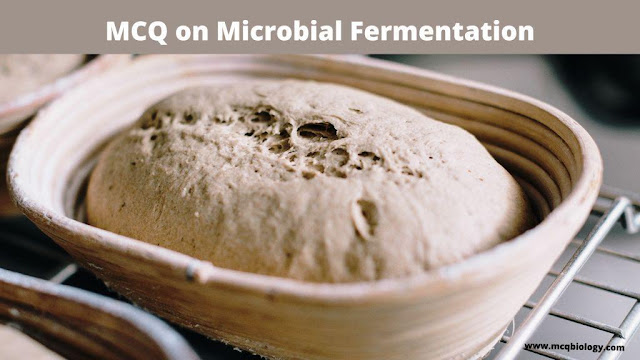1. The word fermentation is used in biochemistry Microbial technology to denote different phenomena. If the former is called C and the latter is called T. Which of the following statement is true?
a) All C is T but all T is not C
b) All Tis C but C is not T
c) T is always a product ot Genetic engineering
while C is not
d) Cis always an aerobic process, while T can be
aerobic or anaerobic
2.
Which of the following microbial fermentations are anaerobic?
a) Ethanol and acetone-butanol
b) Citric acid and propionic acid
c) Penicillin and vitamin Bi2
d) Streptomycin and rifampicin
3.
During the production of alcohol by fermentation using budding yeast, oxygen
supply is kept limited. Why?
a) Budding yeasts are obligate anaerobes and cannot tolerate
oxygen.
b) Budding yeasts lose mitochondria in the absence
of Oxygen.
c) Budding yeasts are facultative anaerobes
d) Alcohol is oxidized further in the presence of
oxygen.
4.
Novel groups of polyketides can be synthesized in Actinomycetes by
a) gene rearrangement.
b) gene amplification.
c) combinatorial biosynthesis.
d) metabolic engineering.
5. Coliforms
are used as indicator organisms of sewage pollution because they
a) are pathogens.
b) ferment lactose.
c) are abundant in human intestines.
d) grow within 24 hours.
6.
Enzymes are nowadays used extensively in bioprocessing industries.
Enzymes 1 is used for the treatment of hides to provide
a finer texture, in leather processing and the manufacture of glue.
Enzyme 2 is used for clarification of fruit juices.
identify Enzymes 1 and 2
Enzyme 1 Enzyme 2
a) Amylase Pectinase
b) Protease
Amylase
c) Protease
Pectinase
d) Pectinase
Amylase
7. The
following table lists some of the enzymes of fungi and bacteria having wide
variety of industrial applications, including alcoholic beverages, food,
detergents and pharmaceuticals, along with their microbial original
Enzyme Microorganism
A. Amylase E.
Azotobacter vinelandii
B. Asparginase F.
Serratia marcescens
C. Lipase G. Aspergillus aureus
D. Pectinase H.Aspergillus oryzae
The
correct combinations are
(1) A
and H
(2) B
and G
(3) C
and E
(4) D and F
8.
Industrial products in which bacteria are employed for production are shown in
the following table:
I. List of products II. Microorganims
A. 2,3-Butane diol
i) Leuconostoc
B. Dextran ii) Brevibacterium
C. Glutamic acid
iii) Bacillus polymyxa
D. Cobalamine
iv) Propionibacterium
The correct combinations are
(1) A-ii; B-i; C-i; D - iv
(2) A-i;B-i; C-i; D - iv
(3) A -ii; B-ii; C- iv; D-i
(4) A- i; B- ii; C- iv; D-i
9. Electrons are transferred from reduced c enzymes like NADH,
NADPH to pyruvic acid their derivatives during fermentation. Those final electron
acceptors are reduced to the end product for example lactic acid, propionic
acid, etc. end products depend on the particular microorganisms and the
substrate
The organism
End product (s)
A. Streptococcus a. Butanediol, formic acid
B. Clostridium b. Lactic acid
C. Salmonella c. Butyric
acid and iso propanol
D. Enterobacter d.
Succinic acid, acetic acid
The correct match is
1) A-a, B-b, C-c, D-d
2) A-d, B-c, C-a, D-c
3) A-b, B- c, C-d, D-a
4) A-c, B-d, C-a, D-b
10. To produce Blue Veined cheese, the curd is inoculated with strians of
a)Pencillium roqueforti
b)Brevibacterium linens
c) Prionibacterum shermanii
d)Pencillium camemberti
Learn
more: Topic-wise Microbiology MCQ
Answers
1. a) All C is T but all T is not C
2. a) Ethanol and acetone-butanol
3. c) Budding yeasts are facultative anaerobes
4. c) combinatorial biosynthesis.
5. c) are abundant in human intestines.
6. c) Protease
Pectinase
7. A and H
8. (1) A-ii; B-i; C-i; D - iv
9. 3) A-b, B- c, C-d, D-a
10. a)Pencillium roqueforti
